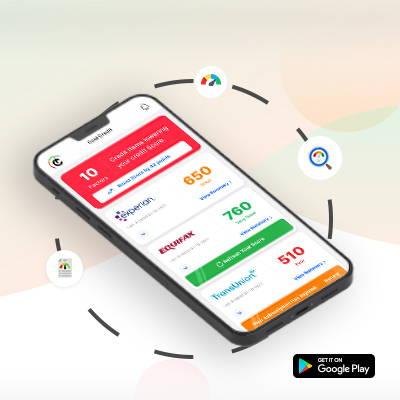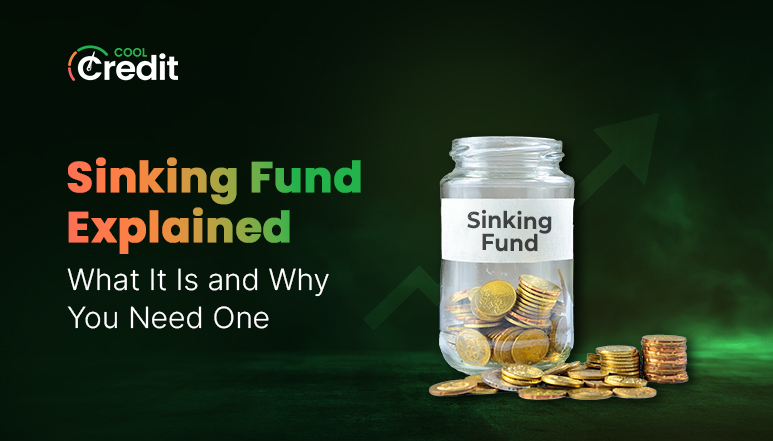
Building Business Credit Profile: How Long Does It Take?
Mixing business with personal life is rarely a good idea, especially when it comes to finances. Even so, 46% of small business owners use personal credit cards for business purposes.
While using personal credit for business purposes might appear to be the best or only possible option, at least initially, it's not a wise choice to make in the long run. But what's the alternative? Building business credit. Yes. And how long does it take to build business credit? Roughly two to three years, given you go by the business credit builders rulebook. Let's discuss the timeline of building business credit along with the how's and why's of it. Read on!
Transform Your Credit:
AI-Powered Repair, Fast Results!
Understanding Building Business Credit
Simply put, building business credit refers to the process of establishing a credit history and credit score for your business entity, one that is separate from your personal credit. This allows you to showcase the creditworthiness of your business, facilitating access to financing and even securing favorable terms with suppliers for business needs.
Importance Of Building Business Credit
In a nutshell, building business credit involves establishing a credit profile for your business, which, in turn, enables you to qualify for business loans. This is especially crucial for entrepreneurs, startups, and established businesses looking to expand or even power through short-term financial constraints. Moreover, business loans can be availed for various reasons, including:
- Business Expansion
- Purchasing Equipment
- Business Acquisitions
- Inventory Management
- Cashflow for Regular Operations
- Payroll Expenses
- Debt Consolidation
Other Benefits Of Building Business Credit
Building a strong business credit profile does more than qualify you for business loans. It comes with its own perks and privileges.
- Building business credit separates personal and business finances, safeguarding personal assets.
- Qualify for loans and credit lines to support business operations and expansion.
- Positive credit history leads to better terms, including lower interest rates.
- Gain vendor trust, negotiate favorable terms, and improve cash flow.
- Secure capital with a strong credit profile to access greater growth possibilities.
- Improve business image with a solid business credit profile, showing credibility and stability.
- Enjoy lower insurance premiums and improved lease terms with good credit.
- Access high-limit, low-interest business credit cards for financial flexibility.
- Establishing business credit as a financial safety net for unexpected challenges.
Difference Between Business Credit Vs. Personal Credit
| Aspect | Business Credit | Personal Credit |
| Purpose | Used for business expenses and financing | Used for personal expenses and loans |
| Reporting Agencies | Dun & Bradstreet, Experian Business, Equifax Business | Equifax, Experian, TransUnion |
| Credit Scores | PAYDEX score (D&B): 0 to 100, with higher scores indicating better payment performance. Intelliscore (Experian): 1 to 100, with higher scores indicating lower risk. | FICO Score: 300 to 850, with higher scores indicating better creditworthiness. VantageScore: 300 to 850, with higher scores indicating lower credit risk. |
| Factors Considered | Business financials, payment history with suppliers, business size | Personal payment history, credit utilization, length of credit history, types of credit in use, new credit |
| Liability | Typically associated with the business entity (e.g., LLC, Corporation) | Tied to the individual’s social security number |
| Credit Limits | Higher credit limits based on business revenue and creditworthiness | Generally lower compared to business credit limits |
| Credit Terms | Often tailored for business needs (e.g., net-30, net-60) | Personal credit cards may have standard terms |
| Impact on Borrowing | Affects the business’s ability to secure loans and credit for operations | Influences personal loan approvals, mortgage rates, and credit card terms |
| Credit Monitoring | Requires monitoring for business-related transactions and credit inquiries | Monitored for personal expenses and credit activities |
| Usage Restrictions | Typically restricted to business-related expenses and investments | Can be used for any personal expenditure |
| Legal Protections | Less regulation and legal protection compared to consumer credit | Subject to consumer protection laws and regulations |
| Separation from Owner | Emphasized separation between personal and business finances | Personal and business finances can be closely tied, especially for small business owners |
Business Credit Reporting Agencies and Their Credit Score Range
| Business Credit Reporting Agency | Credit Score Range |
| Dun & Bradstreet (PAYDEX) | 0 to 10 |
| Experian Business (Intelliscore) | 1 to 100 |
| Equifax Business | 101 to 992 |
| FICO Small Business Scoring Service (SBSS) | 0 to 300 |
Business Credit Score Ranges by Different Reporting Agencies
| Business Credit Reporting Agency | Credit Score Range | Credit Score Category | Credit Score Description |
| Dun & Bradstreet (PAYDEX) | 0 to 49 | High Risk | Frequency pays bills late or has inconsistent payments |
| 50 to 79 | Medium Risk | Occasionally pays bills on time | |
| 80 to 100 | High Risk | Consistently pays bills on time or early | |
| Experian Business (Intelliscore) | 1 to 10 | Low Risk | Consistently pays bills on time or early |
| 11 to 30 | Medium Risk | Moderate risk of serious delinquency or bankruptcy | |
| 31 to 100 | Low Risk | Minimal risk of serious delinquency or bankruptcy | |
| Equifax Business | 101 to 192 | Poor | High risk with a history of late payments |
| 193 to 253 | Fair | Moderate risk with potential for late payments | |
| 254 to 314 | Good | Low risk but may have occasional late payments | |
| 315 to 385 | Excellent | Minimal risk of late payments and low credit utilization | |
| FICO Small Business Scoring Service (SBSS) | 0 to 49 | High Risk | High risk of severe delinquency or bankruptcy |
| 50 to 74 | Medium Risk | Moderate risk of severe delinquency or bankruptcy. | |
| 75 to 100 | Low Risk | Low risk of severe delinquency or bankruptcy |
How Does Business Structure Impact Credit?
Building business credit is not a one-way road. Moreover, there are a lot of influencing factors involved. For one, the structure of the business. Yes, the business structure can have a significant impact on credit. Let's discuss the most common business structures and how each one impacts credit.
◼ Sole Proprietorship
In a sole proprietorship, the business owner and the business are considered a single entity. Resultantly, the owner is solely responsible for all business debts, and any business credit activities can impact the owner's personal credit score.
◼ Partnership
In a general partnership, each partner is equally responsible for the business's debts. Intrinsic to this structure, any adverse business credit events can affect the personal credit scores of each partner.
◼ Limited Liability Company (LLC)
An LLC offers a valuable advantage by affording its members limited liability protection, shielding their personal assets from potential business debts. Even so, it's essential to exercise caution, as personal guaranteeing business loans or intertwining personal and business finances may compromise the protection.
◼ Corporation
In most cases, when it comes to corporations, the shareholders' personal assets are protected debt. However, if a shareholder personally guarantees a loan or engages in activities that blur the line between personal and business finances, it can affect personal credit.
In addition to the impact on individuals, the business structure can also influence how credit is reported. For instance, in some business structures, such as sole proprietorships and partnerships, distinct credit files may not exist. As a result, business transactions may be reported on the owner's personal credit report. Furthermore, lenders may also consider certain business structures more stable or creditworthy than others while evaluating credit applications.
Types Of Business Credit
| Type of Business Credit | Description | Usability |
| Trade Credit | Buying on credit for supplies | Short-term financing for inventory and supplies |
| Credit Cards | Dedicated cards for business expenses | Convenient for daily expenses, with rewards programs |
| Term Loans | Borrowing a fixed amount with predetermined terms | Long-term financing for major investments |
| Lines of Credit | A Revolving credit with a flexible limit | Managing working capital and addressing short-term needs |
| Invoice Financing/ Factoring | Selling off accounts receivable for quick money | Accelerating cash flow by collecting payments early |
| Asset-Based Lending | Using assets as collateral for loans | Securing loans based on the value of pledged assets |
| Microloans | Small, short-term loans for startups or small businesses | Modest capital for initial set up or expansion |
| Government-Backed Loans | Loans with government guarantees | Access to capital for various business needs, backed by government support |
Building Business Credit: How to Get Started
Now that you know why building business credit is imperative and the advantages of a strong business credit profile, let's move on to the next question- "how to get business credit?”
Here's how:
- Build a separate legal entity for your business.
- Attain an Employer Identification Number (EIN) from the IRS.
- Open a dedicated business bank account.
- Have a distinct business address and phone number.
- Register with business credit bureaus (e.g., Dun & Bradstreet, Experian, Equifax).
- Pay bills on time to build a positive payment history.
- Apply for and use a business credit card responsibly.
- Work with vendors that report payments to credit bureaus.
- Regularly check and dispute inaccuracies on your business credit report.
- Gradually apply for larger credit lines as your credit history improves.
- Build relationships with other businesses in your industry.
- Maintain financial stability and responsible financial management.
How Long Does It Take to Build Business Credit?
Typically, building business credit takes two to three years; however, building a good business credit is a gradual process with no fixed timeline. Moreover, the time it takes to build strong business credit can vary based on several factors. Let's go over them.
✅ Timelines of the Credit Reporting Agencies
Yes, the time of reporting can vary among agencies like Dun & Bradstreet, Experian Business, and Equifax Business. And this can impact how long it takes to build a strong business credit profile.
✅ History of Credit Transactions
Simply put, a consistent record of positive credit transactions can impact your business credit and the time it takes to build a good one.
✅ Credit Accounts
How many credit accounts you open and how well you handle them also contribute to building credit over time.
✅ Size and Structure of the Business
Yes, even the size and structure of the business play a role. For instance, larger businesses may build credit more quickly than smaller ones due to better opportunities.
✅ Financial Responsibility
Since your business's credit showcases its creditworthiness, it is crucial to exhibit consistent responsible financial behavior, such as making timely payments.
How Fast Can You Build Business Credit?
As outlined previously, how fast you can build credit depends on various factors. That said, there are a few steps you can follow to expedite the process.
- Open accounts with reputable institutions and take business credit builder loans.
- Pay bills timely to demonstrate financial responsibility.
- Review credit reports regularly for accuracy, and to track the progress of various business credit builder tactics.
- Get in the good books of reporting suppliers.
- Be patient and consistent in your credit management approach.
Business Credit Building With CoolCredit
Building business credit is a gradual process and you need to be cautious of it as it can directly impact your business's growth. Taking on business credit builder loans, paying bills on time, and being patient throughout the process can be overwhelming. Moreover, there are no expert business credit builders to assist you. That said, you can always resort to ai credit repair app like CoolCredit for resources, guidance, and even expert assistance.
Conclusion
Building business credit is crucial for entrepreneurs seeking financial stability and growth. It entails creating a separate credit history for the business, providing advantages such as easier access to financing and favorable terms. Typically, it takes two to three years to build a strong business credit profile if you go by the rulebook. Even though the process can be overwhelming, DIY credit-building apps like CoolCredit can be of help, offering valuable resources, guidance, and even expert assistance if need be.
FAQs
Q: Can an Individual Apply for a Business Credit Card?
A: Yes, many credit card issuers offer business credit cards to individuals who engage in freelance or side businesses. However, specific criteria must be met to be eligible for one.
Q: Is Business Credit Different from Personal Credit?
A: Yes, business credit and personal credit are distinct. Personal credit is built upon an individual's financial history and other determining factors, including personal income, credit history, and debt. On the other hand, business credit is associated with a business and is evaluated based on the business's financial performance, payment history, and creditworthiness.
Q: Can You Use Business Credit to Buy a House?
A: Ideally, business credit is intended for business-related expenses. However, some entrepreneurs or business owners may use business credit for real estate investments. That said, it's essential to clarify the terms and conditions with the credit issuer and seek advice on taking such a course.





